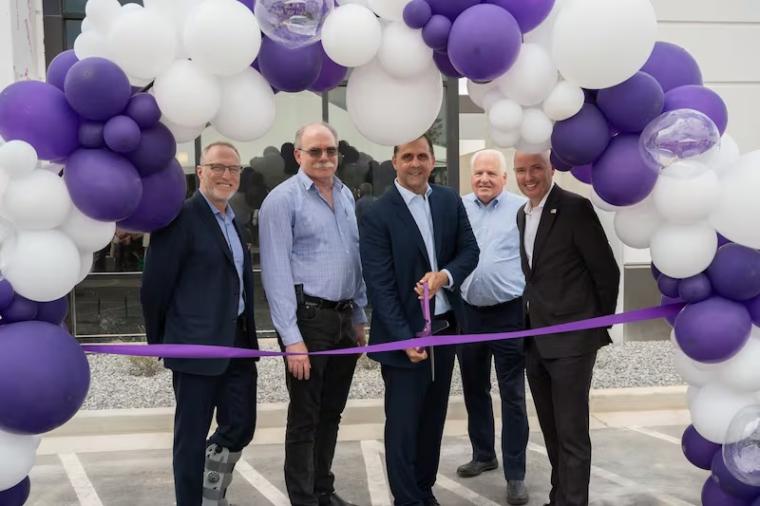
Nusano, a physics company transforming the production of radioisotopes, cut the ribbon recently on its 190,000-square-foot radioisotope production facility. The site will be capable of producing more than 40 different radioisotopes for use in cancer diagnostics and therapeutics, as well as industrial applications, such as long-lived nuclear batteries.
“Utah has always been a place where bold ideas take root, and Nusano’s new facility is a perfect example,” said Gov. Cox. “This work will deliver the radioisotopes needed for cancer treatment, advanced technologies, and national security. We’re incredibly proud to have another true pioneer in our innovation economy.”
Nusano combines time-proven technology from universities and world-class research centers with the company’s patented particle acceleration technology. The result is the first significant advancement in radioisotope production in decades – a highly efficient linear accelerator-based platform capable of simultaneous manufacturing of multiple radioisotopes needed across a variety of industries.
“Nusano is commercializing breakthrough technologies to enable innovation, improve human health, and power exploration,” said Chris Lowe, CEO of Nusano. “From our world class production facility in Utah, we will make radioisotopes in quantities and varieties unsurpassed by older methods. This will help address supply chain bottlenecks, support domestic manufacturing, and deliver life-changing radioisotope supplies needed for cancer care.”
Supply agreements and reservations for Nusano’s radioisotope production are underway. Organizations interested in ordering samples and securing radioisotope supplies should contact sales@nusano.com.
Radioisotopes are essential components in the active pharmaceutical ingredients (API) of new and emerging cancer treatments known as radiopharmaceuticals. Existing medical radioisotope supply chains are often strained, posing a risk to patient care, clinical trials, and ongoing drug development. Nusano is working to address these shortages and deliver new radioisotope supplies so additional therapeutic approaches can be explored.
“Today, researchers and drugmakers are working with what’s available, not necessarily what’s optimal,” said Dr. Howard Lewin, co-founder and Chief Product Development Officer of Nusano. “Our Utah facility can produce up to 12 different radioisotopes simultaneously. This means we can meet the existing needs of drugmakers and at the same time enable tomorrow’s clinical breakthroughs with isotopes that would be unavailable or hard to access without Nusano’s production.”
Beyond healthcare, radioisotopes have applications across a variety of industries, including advanced aerospace and defense technologies. One such use is long-lived batteries powered by radioisotopes, known as nuclear batteries.
Ideally suited for nuclear batteries is a class of radioisotopes known as alpha-emitters, which Nusano can produce at scale. The long half-life of certain alpha-emitting radioisotopes produces steady, dependable sources of energy. This can equate to a multi-year battery lifespan, depending on the isotope selected. Alpha-emitters also offer low-penetration radiation, which reduces shielding requirements, enabling compact, durable battery designs that can often be placed directly onto the computer chip powered by the battery.
“Nuclear batteries are always-on systems built to provide power in places where it would be inconvenient or impossible to routinely swap out traditional batteries, such as remote ocean sensors or space satellites,” said Glenn Rosenthal, co-founder and Chief Technology Officer of Nusano. “The longevity and efficiency of nuclear batteries has the potential to redefine how connected devices are powered in ways that will improve modern logistics and enable the continued exploration of our universe.”
